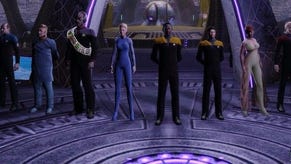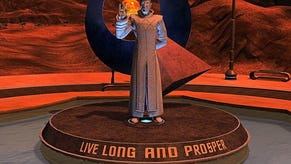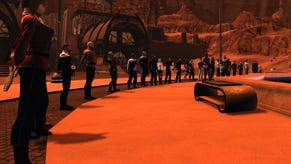Star Trek Online
Ready steady Kirk.
On foot, you participate in messy firefights with quite large groups of enemies, backed either by four AI bridge officers, four other players, or a mixture of the two. You're selecting hard targets and punching out skills in the MMO style, but everything's a lot faster, you have fewer skills, and there are several action-game twists such as flanking damage, cover and a crouched "focus" mode that make movement and positioning important.
It's shallow fun, but rather incoherent, and the extremely fast rate at which your shields and health recharge means that you seem either to be invincible or dead in a flash, but it's seldom clear why. The three character classes - Science Officer, Tactical Officer and Engineer - each have different utility, but they aren't that clearly drawn and are defined more by the weapons and equipment they're carrying, since these dictate their main combat skills.
Teamwork and tactics don't really come into play and ground combat remains an unchallenging, repetitive and random fracas (although you can pause the action even when grouped with other players to issue orders to your AI companions, Dragon Age style).
It's the ship combat that shines. Despite the slow movement of the spacecraft under impulse power, and their ponderous turning circles (which mean the game sometimes looks like houseflies doing a mating dance in treacle), fighting in space is intense, rhythmic, finely balanced and thoroughly enjoyable. The basics remain the same - circle enemy ships, using energy weapons to deplete their shields enough to fire photo torpedoes against their hull. Manoeuvring skill and timing are key.
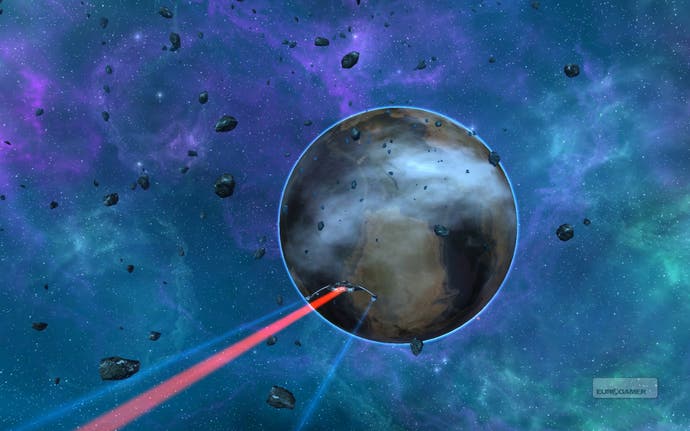
But there's also a wide range of tactical options in the way you fit your ship out with weapons, bearing different types of damage and firing arcs in mind, and bridge officers, who essentially provide interchangeable skills - not to mention shield and power management. All of this is nicely brought into focus by the different types of enemy you'll need to combat, from swarms of weak fighters to hulking, heavily armoured cruisers via trios of slippery frigates.
While switching weapons and "kits" (extra skills, essentially) on your ground character tends to be no more than a way to alleviate boredom, customising and optimising your starship setup is a satisfying, absorbing and never-ending pastime, especially once you've reached the rank of Lieutenant Commander and are able to specialise in nimble offensive Escorts, large and powerful Cruisers or flexible Science Vessels. As ever with Cryptic, the whole thing is based on a head-scratchingly bizarre, unintuitive and poorly-explained RPG system - but at least in this case the basics are simple to grasp and the rest can wait.
Every time you advance in rank (every 10 "levels" or so) you get to choose a new ship, and they provide some of the most exciting milestones and most enticing carrots in any MMO. Your ship, and how much you covet your next one, is the glue that holds Star Trek Online together - because, sadly, there's little else that does.
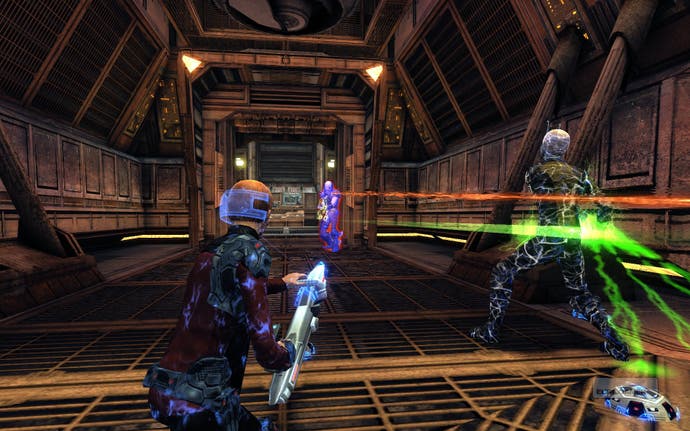
It's an extremely bitty game. Content comes in chunks that last anything from five minutes to an hour, but chunks is the operative word - they're discrete missions in small instanced locations, each existing in its own bubble with little or nothing to connect it to the big picture. Even that big picture - "sector space", the abstract star map that connects one system or deep space encounter to another, that you crawl across at warp speed - is broken up into tight little squares. Loading screens are everywhere, and the use of instancing is extreme, relentless.
There's little sense of place or continuity, and that applies to the game's social dimension, too. It's great that there are no server divisions as such and you'll always be able to find your friends, but the fact that absolutely all content scales to accommodate either a solo player or several means you never have to group, and the style of both space and ground combat means you never have to get organised - you just shoot away until you're done.

